KATHMANDU: Former Finance Minister Surendra Pandey has voiced concern over the increasing trend of youth and students leaving Nepal for study and employment opportunities abroad.
In an interaction program on ‘Concordance between Monetary Policy and Finance Policy’, jointly organized by the Institute for Strategic and Socio-Economic Research (ISSR) and Khabarhub at the Pavilion Hall in Kathmandu, Pandey directed his question towards Finance Secretary Madhu Marasaini and Nepal Rastra Bank Governor Maha Prasad Adhikari.
Former Finance Minister Pandey highlighted the escalating number of individuals seeking opportunities overseas.
He noted that this year alone, as many as 539,000 individuals obtained permission for foreign employment by the end of March, marking a substantial increase compared to the previous years.
With over 7.71 lakh leaving last year and more than 6 lakh the year prior, Pandey underscored the pressing need to address this trend.
Pandey, while acknowledging the uncertainty surrounding the exact number of departing students, emphasized the significant financial implications.
Citing a staggering 89 billion rupees already spent this year on foreign studies, he projected the figure to exceed 150 billion rupees by year-end.
Pandey posed critical questions regarding the trajectory of remittances in the coming years.
“Will this trend of outbound migration persist or diminish over the next five years?” he queried, probing into its implications on Nepal’s remittance-driven economy.
Addressing historical factors such as job scarcity and conflict-induced displacement, Pandey noted their dwindling relevance in the current context.
“Privatization-induced job scarcity and conflict-induced migration are no longer prevalent,” he remarked.
“Understanding the current motivations behind emigration is crucial for anticipating its future impact.”
Pandey also emphasized the imperative to discern the contemporary factors driving emigration and their prospective consequences in the near future, particularly within the upcoming five years.









Comment